Related Research Articles
"Always on My Mind" is a ballad written by Wayne Carson, Johnny Christopher, and Mark James, first recorded by Brenda Lee and first released by Gwen McCrae in March 1972. Lee's version was released three months later in June 1972. The song has been a crossover hit, charting in both the country and western and pop categories. Elvis Presley's recording was the first commercially successful version of the song.
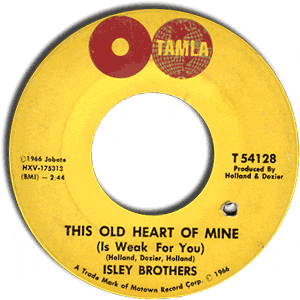
"This Old Heart of Mine (Is Weak for You)" is a Holland–Dozier–Holland song that was a hit for American musical group the Isley Brothers in January 1966 during their brief tenure on Motown's Tamla label. Featuring Ronald Isley on lead vocal, "This Old Heart of Mine" peaked at number twelve on the Billboard Hot 100, and at number six on the Billboard R&B Singles chart.

"Three Times a Lady" is a 1978 song by American soul group Commodores for their album Natural High, written by lead singer Lionel Richie. It was produced by James Anthony Carmichael and Commodores.

"You Got It" is a song from American singer Roy Orbison's 22nd studio album, Mystery Girl (1989). The song was released posthumously on January 3, 1989, after Orbison's death from a heart attack on December 6, 1988. The song was issued with "The Only One" as the B-side and was later released with "Crying". The single reached number nine on the US Billboard Hot 100 and number one on the Adult Contemporary chart, returning Orbison to the top 10 for the first time in 25 years. "You Got It" also reached number three on the UK Singles Chart and entered the top five in 10 other countries. Although it is an Orbison solo single, Orbison's fellow Traveling Wilburys bandmates, Tom Petty and Jeff Lynne, co-wrote the song and played instruments on the record.

"When a Man Loves a Woman" is a song written by Calvin Lewis and Andrew Wright and first recorded by Percy Sledge in 1966 at Norala Sound Studio in Sheffield, Alabama. It made number one on both the Billboard Hot 100 and R&B singles charts. Country singer John Wesley Ryles had a minor hit with his version of the song in 1976 while singer and actress Bette Midler recorded the song 14 years later and had a Top 40 hit with her version in 1990. In 1991, Michael Bolton recorded the song and his version peaked at number one on both the Billboard Hot 100 chart and the Billboard Adult Contemporary Singles chart.

"It's Only Make Believe" is a song written by drummer Jack Nance and Mississippi-born singer Conway Twitty, while they were touring across Ontario, Canada in 1958. Twitty was a relatively unknown rock n' roll singer at the time, and this song was his first hit, reaching No. 1 on the 'Billboard chart in November 1958 for two weeks.
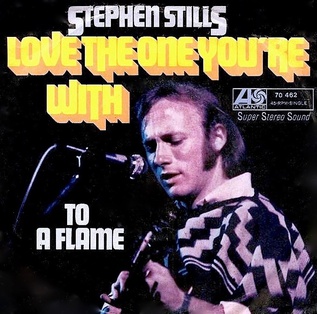
"Love the One You're With" is a song by American folk rock musician Stephen Stills. It was released as the lead single from his debut self-titled studio album in November 1970. The song, inspired by a remark Stills heard from musician Billy Preston, became his biggest hit single, peaking at No. 14 on the Billboard Hot 100 in early 1971. David Crosby and Graham Nash, Stills' fellow members of Crosby, Stills & Nash, provide background vocals on the song. Also providing the backups are Rita Coolidge, her sister Priscilla Jones, and John Sebastian. They all sing the "Do Dos" that come before the instrumental portion and the Outro. The song was also recorded by the Isley Brothers, The Meters, Bucks Fizz, Luther Vandross, Bob Seger and Richard Clapton, among others.
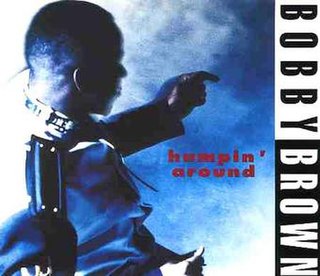
"Humpin' Around" is a song by American singer Bobby Brown. It is rumored that the song was originally titled "Fuckin' Around", with the name later changed to make it more radio friendly, and to avoid potential censorship. The song contains an interpolation of "Dancing Days" by Led Zeppelin.
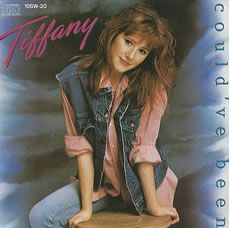
"Could've Been" is a song by American teen-pop singer Tiffany, released as the third single from her debut album, Tiffany (1987). Commercially, the song proved to be a successful follow-up to her debut single "I Think We're Alone Now", peaking atop the US Billboard Hot 100, the Canadian RPM Top Singles chart, and the Irish Singles Chart in early 1988. It also reached number four on the UK Singles Chart and number five in New Zealand.

"Honky Tonk Moon" is a song written by Dennis O'Rourke, and recorded by American country music artist Randy Travis. It was released in June 1988 as the lead off single from his album Old 8x10. It became his seventh and fifth consecutive number 1 hit in the United States. It peaked at number 1 on the Billboard Hot Country Singles & Tracks chart.
"Strong Enough to Bend" is a song written by Beth Nielsen Chapman and Don Schlitz, and recorded by American country music artist Tanya Tucker. It was released in June 1988 as the first single and title track from the album Strong Enough to Bend. The song was Tucker's ninth number one on the country chart as a solo artist. The single went to number one for one week and spent a total of fifteen weeks on the country chart.
"I'm Gonna Get You" is a song written by Dennis Linde. It was first recorded by Billy Swan, whose version was released as a single in 1987 and went to number 63 on the U.S. country singles charts. It became a hit the following year for Eddy Raven. It was released in January 1988 as the first single from his compilation album The Best of Eddy Raven The song was Raven's third number one on the country chart. The single went to number one for one week and spent a total of fourteen weeks in the Top 40.

"Cry, Cry, Cry" is a song written by John Scott Sherrill and Don Devaney, and recorded by American country music group Highway 101. It was released in January 1988 as the fourth single from the album Highway 101. The song was Highway 101's second number-one single on the country chart. The single went to number one on the Hot Country Singles chart, holding the position for one week. In Canada, the song went to number one on the RPM country singles chart.
"I Know How He Feels" is a song written by Rick Bowles and Will Robinson, and recorded by American country music artist Reba McEntire. It was released in August 1988 as the second single from the album Reba. The song was McEntire's eleventh number one country hit. The single went to number one for one week and spent a total of fourteen weeks on the country chart.
"Change of Heart" is a song written by Naomi Judd, and recorded by American country music duo The Judds on their debut January 1984 extended play, Wynonna & Naomi. It was re-released in October 1988 as the second single from their Greatest Hits compilation album. The song was their twelfth number one country single. The single went to number one on the Billboard Hot Country Singles for one week and spent a total of fifteen weeks on the country chart.

"New Fool at an Old Game" is a song first recorded by Canadian country music artist Michelle Wright. Wright's version was released in 1987 on Savannah Records as the second single from her 1988 album Do Right by Me and peaked at number 11 on RPM Country Tracks chart in Canada. American Country Music Hall of Fame artist Reba McEntire released her version in December 1988 as the third single from her album Reba. It was her twelfth number one on the country chart. The single went to number one for one week and spent a total of fourteen weeks on the country chart. The song was written by Steve Bogard, Rick Giles, and Sheila Stephen.
"This Night Won't Last Forever" is a song written by Bill LaBounty and Roy Freeland, and originally recorded by LaBounty in 1978, whose version of the song was a minor Adult Contemporary and pop hit, reaching number 65 on the Billboard Hot 100.
'Summer Wind' is a song written by Chris Hillman and Steve Hill, and recorded by American country music group The Desert Rose Band. It was released in July 1988 as the first single from the album Running. The song reached number 2 on the Billboard Hot Country Singles & Tracks chart, just behind "Darlene" by T. Graham Brown.
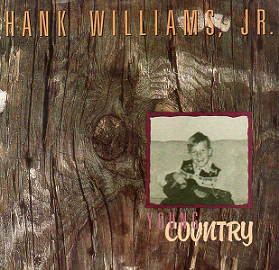
"Young Country" is a song written and recorded by American musician Hank Williams Jr. It features guest vocals from Butch Baker, Steve Earle, Highway 101, Dana McVicker, Marty Stuart, Keith Whitley, T. Graham Brown. It was released in February 1988 as the third and final single from his album Born to Boogie. It peaked at number 2 in the United States and in Canada.

"Can't You See" is a song written by Toy Caldwell of The Marshall Tucker Band. The song was originally recorded by the band on their 1973 debut album, The Marshall Tucker Band, and released as the album's first single. Record World called it "a strong rhythm item that continually builds and builds." It was re-released in 1977 and peaked at number 75 on the Billboard Hot 100. Cover versions of "Can't You See" have charted for Waylon Jennings and the Zac Brown Band with Kid Rock (2010).
References
- ↑ Whitburn, Joel (2004). The Billboard Book Of Top 40 Country Hits: 1944-2006, Second edition. Record Research. p. 59.
- ↑ "T. Graham Brown Chart History (Hot Country Songs)". Billboard.
- ↑ "RPM 100 Country Singles" (PDF). RPM. November 12, 1988.
- ↑ "Top 100 Country Singles of '88" (PDF). RPM. December 24, 1988. p. 15.
- ↑ "Hot Country Songs – Year-End 1988". Billboard. Retrieved July 10, 2021.